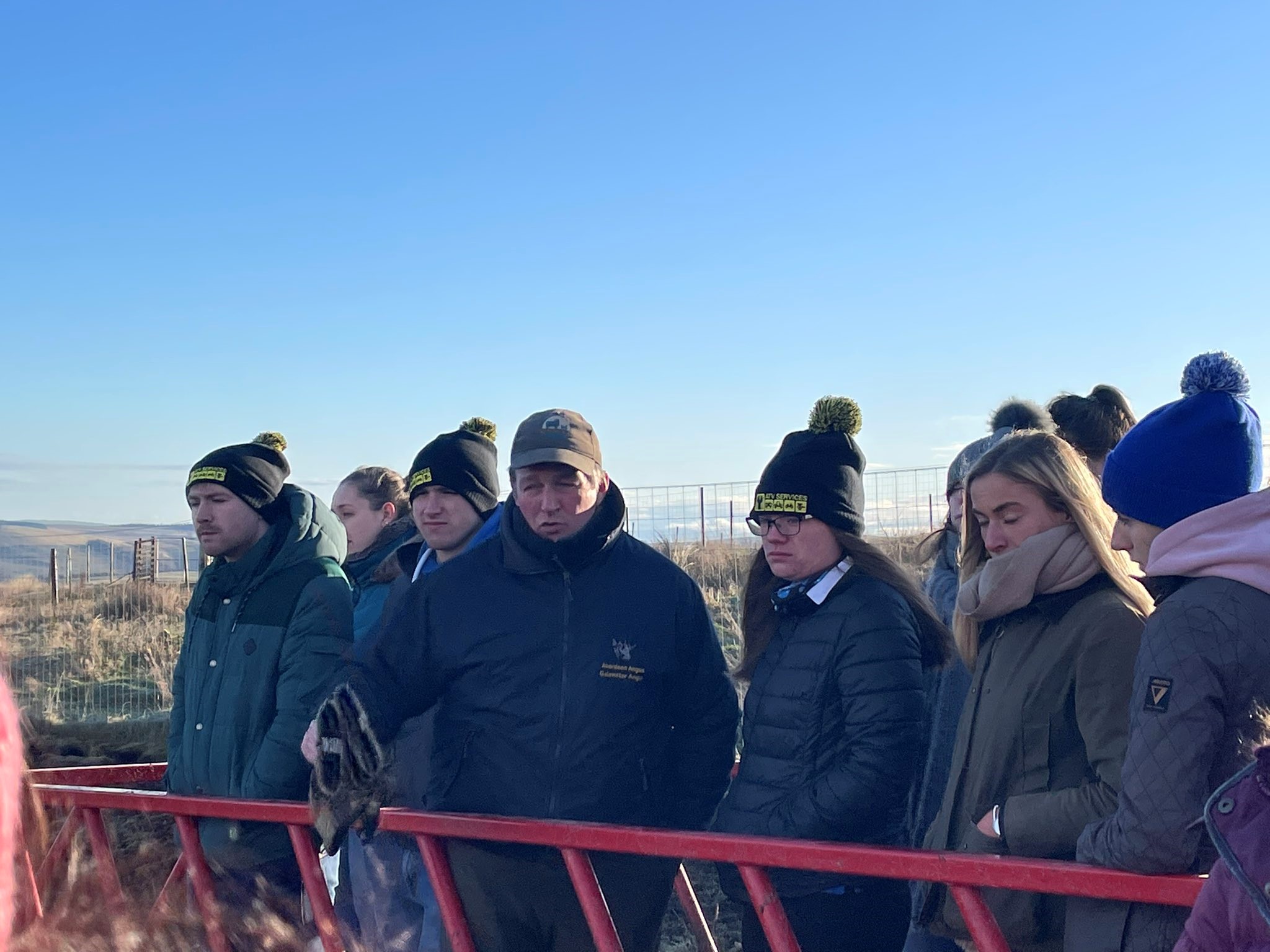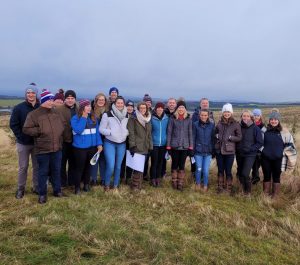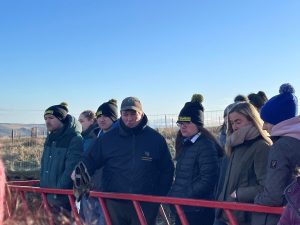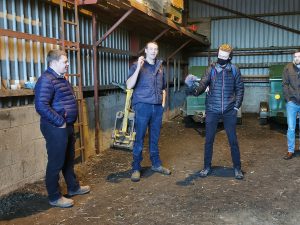
08 Dec The country’s Young Farmers focus their attention to ‘Selling Scotland’!
SAYFC hosted their seventh Agricultural and Rural Affairs Conference from 3rd – 5th December themed for 2021 as “Selling Scotland”.
Introduced initially as a result of demand from members, the event provided an opportunity for rural youth to directly see and hear how they can best positively impact the farming and agricultural sector. Agricultural and Rural Affairs Chair Alistair Brunton commented:
“As with most Young Farmers weekends it’s a great social event and a chance to meet likeminded individuals from the length of the country. The ‘Selling Scotland’ theme was decided on due to all the uncertainty over the past couple of years with; Brexit, Covid-19 and climate change. It was important for us that this weekend was full of learning, – how best to sell our industry and each of our story’s in a positive light!”
Supported by Galbraith, The Royal Bank of Scotland and SAC Consulting – the conference included farm visits, presentations, panels and themed breakout sessions.
The Friday evening was kindly hosted by The Sinclair Family at Craigie’s Farm where the young farmer audience enjoyed hearing from John Sinclair (Craigie’s Farm Shop & Deli), Alan Leslie (Buying Director of Meat for Scotland at Aldi UK) & John Davidson (Strategy & External Relations Director at Scotland Food & Drink). In the chair, keeping the panel right, was Alistair Brunton (SAYFC Agri & Rural Affairs Chair).
John Sinclair, owner of the venue stipulated that the interests of customers is fed from their great experience of a day in the countryside, seeing produce as a by-product of that experience. He acknowledged; “It is so important for farmers to innovate and look at the different ways in which we can make money from what we are doing by listening to what the consumer wants.”
Alan Leslie spoke of the need for farmers to shout about what they can offer, remembering that assurance schemes mean a lot to the customer and also the retailer! He mentioned an urge for more collaboration along the supply chain however concluded that if he was currently a farmer, he wouldn’t be hugely concerned about consumers buying overseas produce – stating:
“It is all about working closely together and I passionately believe that the days of transactional bartering between producers, processers and retailers will come to an end. I believe in nothing more than genuine cost of production models – that is how I see industry going over the next couple of years.
“We shouldn’t be concerned (about food imports) demand is there for Scottish produce and I see that loud and clear every day in my job. People want to be buying red meat here in Scotland. Demand is there, it is about making sure the supply chain is economically stable for all parties and provided we work together and get that right on the ground we shouldn’t be too concerned.”
Export specialist John Davidson (of Scotland Food & Drink) brought to the audience attention that food prices in the UK are some of the cheapest in the world and that the grassroot farmer’s margins are being squeezed with not only financial pressures rising but also a strong competition in the industry. He settled his statements with:
“There is going to be inflation, but I think the debate around food prices in the UK has to come, and it has to centre around what does that mean for producers, what does that mean for money back down to farms, it will be a difficult debate but it has to be had.”
Members on Saturday morning descended on buses to the various farm tours; Pirntaton Farm (Galashiels), Easter Bavelaw Farm (Balerno) & Learielaw Farm (Broxburn).
Diversification, a hot topic across Scotland’s forward thinking farming and crofting families and it takes a strong and confident business owner to convert a lucrative pedigree enterprise into one solely reliant on commercial livestock. However, at Jim Logan’s visit to his Scottish Borders based farm – he proved that a farm’s productivity can be heightened by making that initial constructive (and sometimes risky) move! Young Farmers from all necks of Scotland viewed the Logan’s in calf heifers and their bale grazing system, plus their breeding ewes and their turnips feeding source now ready for consumption – and lastly the farm’s extremely interesting deer grazing over 1500 feet!
Locally to Edinburgh, a group visited Graham and Becci Barr of Easter Bavelaw Farm who have planted 90,000 trees. Delegates were also met by both Virginia Harden Scott from Scottish Forestry and Mark Hamilton – a private consultant for forestry.
During the tour, there was an open discussion pointing out all work undertaken to submit an application and initial surveys, plus the physical planting and maintenance.
Graham and wife Becci encouraged the young landowners to research forestry grants from woodland-creation schemes and advised anyone interested in exploring woodland creation, to check Scottish Forestry maps to pinpoint whether or not they’re eligible. It was shown, first hand, that these creations should be viewed as a long-term commitment and investment – not solely a quick money making method from grants.
Arguably the closest host to Ingliston, The Dandie family residing on the outskirts of Edinburgh took a query-fueled group around their farm discussing their practices. With lots of attention currently focused on renewables –the family’s dedication to making a change at farm level was clear! David Dandie enlightened members on their soil compaction work, their carbon audits and their inclusion in one of SAC Consulting’s benchmarking group!
In returning to Ingliston, Andrew Lacey of Scotland’s Rural College & SAC Consulting was guest speaker with the conversation turning to agricultural policy in Scotland and the need for the country to now; “be specific about our own geography and systems, and embrace the complexity that is what makes farming different, don’t deny it exists.”
His advice to delegates was to ‘get outside farming’ and to learn from other businesses and bring those skills back – to move beyond the echo chamber of the industry. Delegates then focused on SAC Consulting’s carbon foot printing tool – AgreCalc.
Dr Lee Innes from Moredun Research Institute ran a second session for members highlighting the importance of a one health approach to controlling disease and also the need to reduce anti-microbial resistance moving forward for both animals and humans, touting the organisation’s phrase of ‘test, don’t guess’ when it comes to treating livestock.
It was highlighted to the group that there’s currently rising concerns around vector-borne diseases with temperatures increasing due to climate change. They were told that losses associated with disease cost the UK £1bn a year and that 75% of emerging infectious diseases had an animal origin.
Agritourism was very much on everyone’s mind as they heard from the host of the last session, Scottish Agritourism’s Caroline Millar. The young farmers were told that they:
“have the potential to support the incomes of multiple family members but there has to be a proper discussion with family before starting a diversified business …. around expectations on time commitments, ownership and management.”
An Agritourism Strategy being implemented by the government could seriously help new business startups and there is a unique opportunity in ever areas for food and drink experiences and farm tour experiences, it was stated.
Completing the weekend’s conference was the final panel session, chaired by past Machars YFC member Colin Ferguson of Grennan Farm & latterly of NFUS. It heard from Quality Meat Scotland’s Alex Ritchie, RHET’s Christine Brown and The Scottish Farmer’s Claire Taylor themed ‘Selling Scotland’.
Integrated food and farming education to school pupil’s learning experience, now more than even, was an important discussion had. Christine Brown explained that the information given to schools has to tie in with the curriculum:
“Unless subject matter is in the curriculum a teacher will not deliver it, so we need to be really clear that what we are talking about is linking into a curriculum for excellence and the subject areas, at whatever level that may be. We need to channel the right information into the right place that is critical.”
Alex Ritchie made clear that targeting developing young workforce officers in schools would be a key starting point, stating:
“They are the new version of career teachers in schools, and we need to be having conversations with them. For too long careers in agriculture have been viewed as a poor option, we need to change this perception and educate the career influencers to value a career in farming, so this information is then trickled down to pupils.”
Colin stipulated that various career paths at college or university can easily result in a career in agriculture, emphasising the need for the sector to develop a domestic workforce and start paying better!







